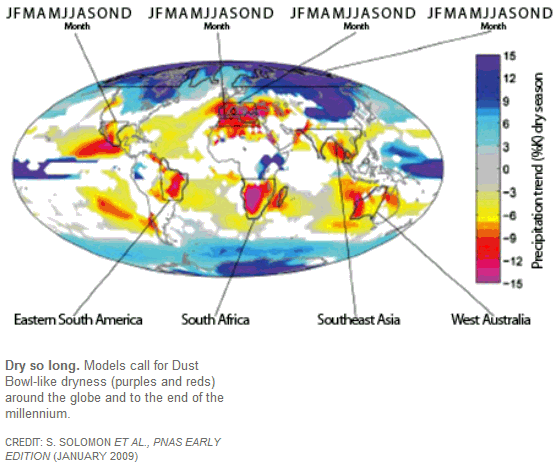|
|
|
|
|
|
|
News & Views item - January 2009 |
![]() Slow Dispersal of CO2 May Effect Climate Through to Next Millennium.
(January 29, 2009)
Slow Dispersal of CO2 May Effect Climate Through to Next Millennium.
(January 29, 2009)
A paper published online on Monday in the Proceedings of the National Academy of Sciences suggests that the carbon dioxide we're emitting this century will be slow to disappear and climate so slow to respond, that the effects that will be felt in a century or two will be almost as strong a thousand years hence.
According to ScienceNow: "Susan Solomon of the National Oceanic and Atmospheric Administration's Earth System Research Laboratory in Boulder, Colorado, and her colleagues report how they used results from two kinds of climate models--century-scale and millennial-scale--to calculate the climate out to the year 3000. The end results showed how two climate processes work against each other to sustain the peak warming to be seen a century from now until the year 3000: The slow escape of atmospheric carbon dioxide into the deep sea tends to ease the warming in models, the researchers note, but the equally slow drawdown of atmospheric heat into the deep sea tends to compensate for the carbon dioxide loss." And according to Dr Solomon: "The time constants [of the climate system] are so slow, people have a hard time appreciating how long the climate change persists."

Climate researcher David Archer of the University of Chicago says that irreversible climate change "is not a new idea, but it's widely misunderstood." However, while most presentations to the publichave "made it seem that climate change was a century-scale issue," this latest work should help correct the misimpression.
Dr Solomon and her co-authors believe that even with a modest 2°C global warming, southwestern North America, eastern South America, and southern Africa would suffer added summer dryness comparable to the dryness of the disastrous American Dust Bowl of the 1930s, but for centuries, not for just a decade or two.
And Northern Africa, southern Europe, and western Australia would have it twice as bad.